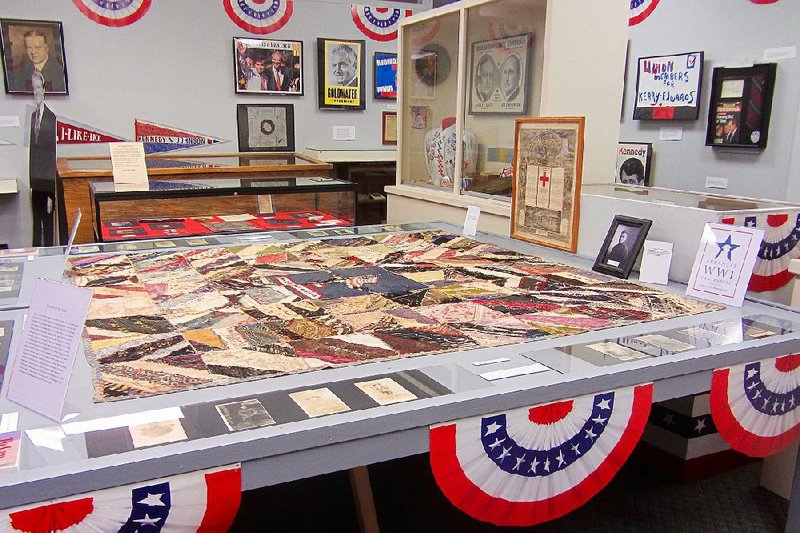CABOT -- Decorative quilts are an American tradition. Local museums in the Natural State often display one or more of these folk-art creations from bygone days, when quilting was a widely shared women's pastime.
But there's something special about the quilt showcased in downtown Cabot's somewhat grandly titled Museum of American History. A more accurate name might be Museum of American Political Memorabilia, for its outstanding collection of material from political campaigns as far back as the 19th century. Also featured are the nation's wars, from the Revolution to current conflicts.
The evocative quilt is the centerpiece of the museum's special exhibit to mark the centennial of the U.S. declaration of war against Germany and the other Central Powers in April 1917. Created by director Mike Polston and Cabot High School students in conjunction with Lonoke County Museum in Lonoke, the displays focus on local men who went to fight in France.
The quilt, as a posting explains, is embroidered with the names of some 60 Lonoke County men serving in the armed forces. It bears a slogan: "Where Old Glory leads, we will follow." The finished quilt was the prize in a raffle, at 25 cents per ticket, to raise money for the war effort.
The winner, Pledger Monk, took care of the quilt. It stayed in the Monk family until the 1990s, when it wound up in storage at Lonoke County Museum. Polston arranged last year for its transfer to the museum in Cabot.
Helping bring the quilt's provenance to life is a posted letter to his aunt and uncle from Guy L. Glover of Cabot, whose name is among those embroidered. Writing from France in December 1918, a month after the war's end, Glover noted, "I had a spell of the influenza since arriving over here."
The flu pandemic of 1918 and other illnesses actually killed more U.S. servicemen than combat did. That included well more than half of the 2,183 fatalities among the 71,862 Arkansans who served in the Army, Navy and Marine Corps.
"This is a wonderful place but the old USA is more wonderful to me," Glover wrote. "Have been over a good part of France. Have seen some very pretty things here but no comparison to the things at home. Even the girls are not as pretty as the American girls, or at least I don't think so."
Another exhibit shows two objects mailed by an unnamed Lonoke County Doughboy with this note: "Dear Mother, I am sending home these little souvenirs. I got the piece of marble from the altar of the cathedral at Verdun and the belt buckle was got off a German soldier."
The most melancholy World War I object is a slip of paper sent by the Army to Walter E. Rankin's next of kin after the Lonoke County soldier had been killed in France. It lists Rankin's serial number, 737045, and the items found on his body that were sent to his family: "Money -- cash, French Francs, 25. Billfold -- 1. Packet, letters -- 1."
The Museum of American History, founded by Polston and his Cabot High students in 1985, contains more than 5,000 artifacts, photographs and documents. In 2003, the facility was named Museum of the Year by the Arkansas Museum Association.
The Museum of American History, 114 S. First St., Cabot, is open 10 a.m.-2 p.m. Friday-Saturday. Admission is free, with donations welcome. For more information, call (501) 286-9665.
Weekend on 03/23/2017
